LP Members Join Immersive Learning Experience Focused on Community Responder Programs in Portland
This month, Local Progress and the Local Progress Impact Lab brought two dozen local elected officials, government staffers, and community partners together in Portland to learn from Portland Street Response (PSR), the city’s mobile community response program. Participants included leaders from Antioch (CA), Austin, Chicago, Detroit, Durham, Los Angeles, Minneapolis, New York City, Oak Park (IL), Philadelphia, Phoenix, and Rochester (NY) to share best practices and identify best practices that can be adapted in their localities.
Over the past two years, community responder programs have gone from theoretical ideas to robust programs with encouraging results. Dozens of LP members are working to introduce and scale a community responder unit in their locality. The two-day trip included sit down meetings to learn from PSR staff and supporting stakeholders, and site visits that allowed LP members to hear and learn directly from PSR staff. Participants met with key stakeholders involved in Portland Street Response, including Fire & Rescue Chief Sara Boone, Street Roots Executive Director Kaia Sand, Portland State University Homelessness Research & Action Collaborative Co-founder Greg Townley, Director of the Bureau of Emergency Communications Bob Cozzie, and Portland Police Bureau Deputy Chief Mike Frome. The group also toured PSR headquarters, as well as the 911 call center to understand how dispatchers transfer calls to PSR.

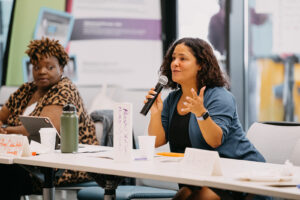
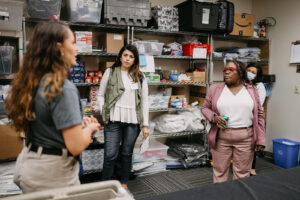

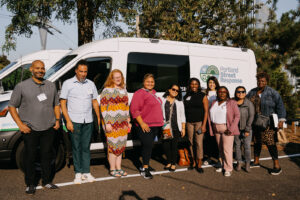

LP member and Portland City Commissioner Jo Ann Hardesty championed the PSR program from its inception, supporting it to become one of the few city-operated mobile response programs in the country that is operating citywide.
“Portland Street Response is one of the most innovative and successful new programs in Portland’s history, providing the first major update to our first response system in almost 100 years. As PSR continues to expand, we continue to ensure the most effective first response is sent to the right 911 call,” she said. “Portland Street Response’s success is inspiring the whole country, and that is something all Portlanders can be proud of. It was an incredible honor to host over two dozen leaders from around the country that want to bring Portland’s model to their home.”
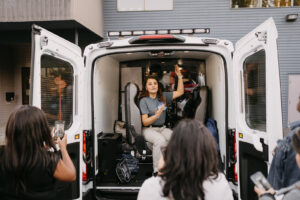


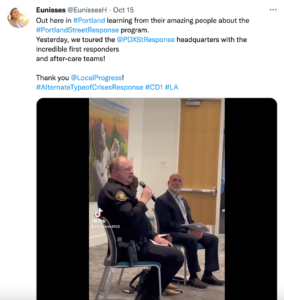
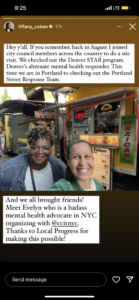
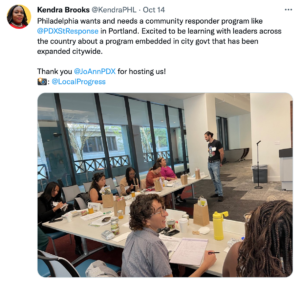
"When someone is experiencing a mental health crisis, the only people who are equipped to respond in order to deescalate are those trained in trauma-informed care, like a mental health crisis responder."
Portland Fire & Rescue Chief Sara Boone
“I push this work because when I think about Irene Chavez - who was experiencing PTSD - being put in a police car and taking her own life after being left alone in a room instead of being connected with help, I know she could still be here if we had a different response."
Chicago Alderperson Rossana Rodriguez-Sanchez
“Two weeks ago, five officers shot a man 38 times in three seconds responding to a mental health call. I will never forget those numbers. With the American Rescue Plan Act, we have $7 million to invest in our communities and I’m excited to learn what we can do around community response.”
Detroit City Councilmember Gabriela Santiago-Romero
In sharing what this trip meant for her, Los Angeles City Councilmember-Elect Eunisses Hernandez said, “Being here gave me a lot of hope. Meeting with the responders yesterday gave me a lot of hope. I’m grateful for that.”
Polling shows that voters – including a majority of Republicans – strongly support sending healthcare experts instead of armed officers to support people having a mental health crisis, dealing with substance abuse, or experiencing homelessness. Even police chiefs have spoken out in support.
“Using police [and fire] resources to address these problems is inefficient and is actually a waste of money in the long run. If my house is having a problem with plumbing, I’m not going to call a general handyman because they’re kind of ok at plumbing. I’m going to call a plumber that has experience. Police officers are multi-tools, we are swiss army knives, we have developed into jack-of-all-trades by necessity. Every year for the past 20 years there have been additional things pushed into our scope. Let the people who want to focus on becoming specialists in crime, become specialists in crime. And then let’s let people who want to focus on helping people, do that.”
Portland Police Deputy Chief Mike Frome
With growing awareness and popularity, more localities are working to implement and scale these programs. To further support local elected officials in creating and scaling community responder programs, the Local Progress Impact Lab released a new tool: Reform/Transform: Creating a Community Responder Program. The report includes concrete guidance on how to ensure meaningful community engagement, programmatic recommendation on pilots and evaluations, insight on financing responder programs, and lessons learned from Albuquerque, NM, Durham, NC, and Oakland, CA.
“What we’re trying to do is really change culture. Police culture is not easy to change. Fire culture is not easy to change. And 911 culture is not easy to change. We are trying to do a cultural shift in an institution that believes there is one solution to these calls. No matter what we do, if we don’t get our mental health system fully funded and stabilized, all we’re doing is rearranging chairs on the titanic.”
Commissioner Jo Ann Hardesty